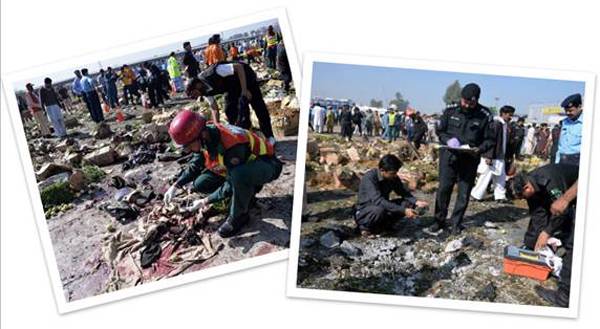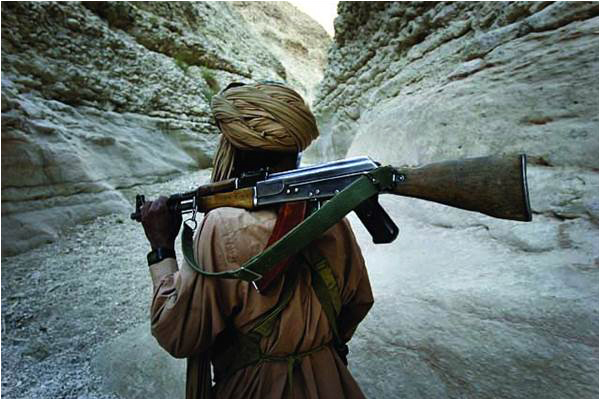
Following back-to-back blasts in Sibi and Rawalpindi last week, claimed by the hitherto unknown United Baloch Army (UBA), comparisons between the UBA and Tehrik-e-Taliban Pakistan (TTP) have spiraled to the point of going berserk. Just like most realms, soon after making an impact this adolescent militant organisation is being compared to the biggest name in the terrorism business – the trendsetters of lethal bombings in the country, if you will. Even so there is still uncertainty lingering over the manner in which this new kid on the block should be welcomed. Perhaps understanding the fact that the differences between the two resoundingly outweigh the similarities might help on that particular front.
Let us get the obvious off the table first. First: the act of killing innocent people owing to any religious/ nationalistic/jingoistic/imperialistic agenda is wrong. Second: it is probable that the UBA had nothing to do with the Rawalpindi blast.
The interior ministry laughed off the link between UBA and the blast because the fact that Baloch separatists can now wreak havoc in the capital would be too much to digest for everyone who is a part of the government and the establishment. While UBA, after realising that no one was coming forward to accept responsibility, might have wanted to take “credit” for it owing to the same, aforementioned, reason.
Considering the inner turmoil among the multitudinous Taliban factions, one of them might have carried out the bombing. But since this could very well be dubbed a conspiracy theory, let us vie to spot the difference between the UBA and the TTP by picking the UBA’s word over the interior ministry’s; that the UBA was actually responsible for the Rawalpindi blast.
The UBA is not telling the government what is wrong with the country’s constitution or how they are ineligible to rule at all according to the UBA’s ideology. It is not forcing the government into governing the state the way it wants it to be governed, unlike the Taliban. It is seeking autonomy and not trying to take over Pakistan. TTP meanwhile has clearly stated that Islam tells them to bomb Pakistani citizens and to usurp the state by excommunicating the constitution.
The immediate grievance resulting in UBA’s attack is the security forces’ action in Kalat, Turbat, Panjgur and Mastung. Snowballed concerns over the past 67 years include multiple large-scale military operations, human rights abuse and the reluctance of the government to sit atop the negotiation table and discuss a fairer deal for natural resource royalties and a bigger share in the provincial revenue for Balochistan. TTP’s grievance is that Pakistan is Dar-ul-Harb since it is being run democratically – Dar-ul-Islam can only have a caliphate, as has been reiterated by the TTP’s spokesmen on multiple occasions.
[quote]Negotiations with the UBA would actually bring the government and the Baloch separatists closer to a solution[/quote]
Negotiations with the UBA would actually bring the government and the Baloch separatists closer to a solution, which lies in giving Balochistan a greater share of the revenue that originates from the province. The Baloch aren’t challenging the writ of the state by telling how the government should rule the rest of the provinces, which is why military operations and the myriad missing persons are aggravating the situation in the province. The solution to the TTP question lies in a military operation, not only because negotiations with the Taliban and ceasefires have constantly failed over the past decade or so, but because the TTP have openly declared war against the Pakistani state on multiple occasions. They have killed over 50,000 innocent citizens, not owing to a demand for greater autonomy but simply because the TTP believes it is its ideological right to coerce 200 million Pakistanis into living the way the Taliban want them to live.
And so ironically the government is trying to deal with the Baloch crisis the way the Taliban issue should be dealt, while the TTP question is being solved through the solution to the Baloch question.

The TTP’s conflict with the Pakistani state is an ideological war, which is why all who agree with the Taliban’s ideology – many of them sitting in the parliament – never condemn TTP’s violence. Baloch separatism follows the same principle that Pakistan followed while separating from United India and owes its roots to the Pakistani military taking over Balochistan in 1947 after the King of Kalat had chosen independence in lieu of being a part of Pakistan. That Balochistan Liberation Army’s (BLA) Hyrbyair Marri has condemned the Islamabad blast and UBA’s tactics echoes the Baloch separatists’ policy against the killing of innocent citizens and reiterates that Baloch separatism – unlike the TTP ideology – is not a monolith.
At a time when bloody murder is being yelled left right and centre owing to the Protection of Pakistan Ordinance (PPO), that is believed to violate the basic human rights of Pakistani citizens, it is tragically ironic to see Baloch separatism being equated with Taliban imperialism. Balochistan, where an inhuman version of PPO is the unwritten law that is facilitating the military in lifting and dumping the Baloch at will.
Many a Taliban apologist, under the garb of analysis, has absurdly equated the Taliban issue with the pre-1971 Bengali crisis. And now despite an actual East Pakistan-esque crisis staring us in the face, not many “analysts” seem to unequivocally condemn the military’s blatant violation of human rights in Balochistan.
While impartially condemning all kinds of violence – whether religiously motivated or nationalistically driven – is the just approach, had enough people done so with regards to the military and the government’s manoeuvres in Balochistan, Baloch separatism would have been “nipped” before spiralling out of control. To lump the Baloch and Taliban crises together in the same basket is to redefine causation by claiming that all effects have the same cause. Understanding the disparity between the two is crucial to solve the respective problems. And if one were actually impartial regarding the two predicaments, one would not need an ideological microscope to spot the difference.
Let us get the obvious off the table first. First: the act of killing innocent people owing to any religious/ nationalistic/jingoistic/imperialistic agenda is wrong. Second: it is probable that the UBA had nothing to do with the Rawalpindi blast.
The interior ministry laughed off the link between UBA and the blast because the fact that Baloch separatists can now wreak havoc in the capital would be too much to digest for everyone who is a part of the government and the establishment. While UBA, after realising that no one was coming forward to accept responsibility, might have wanted to take “credit” for it owing to the same, aforementioned, reason.
Considering the inner turmoil among the multitudinous Taliban factions, one of them might have carried out the bombing. But since this could very well be dubbed a conspiracy theory, let us vie to spot the difference between the UBA and the TTP by picking the UBA’s word over the interior ministry’s; that the UBA was actually responsible for the Rawalpindi blast.
The UBA is not telling the government what is wrong with the country’s constitution or how they are ineligible to rule at all according to the UBA’s ideology. It is not forcing the government into governing the state the way it wants it to be governed, unlike the Taliban. It is seeking autonomy and not trying to take over Pakistan. TTP meanwhile has clearly stated that Islam tells them to bomb Pakistani citizens and to usurp the state by excommunicating the constitution.
The immediate grievance resulting in UBA’s attack is the security forces’ action in Kalat, Turbat, Panjgur and Mastung. Snowballed concerns over the past 67 years include multiple large-scale military operations, human rights abuse and the reluctance of the government to sit atop the negotiation table and discuss a fairer deal for natural resource royalties and a bigger share in the provincial revenue for Balochistan. TTP’s grievance is that Pakistan is Dar-ul-Harb since it is being run democratically – Dar-ul-Islam can only have a caliphate, as has been reiterated by the TTP’s spokesmen on multiple occasions.
[quote]Negotiations with the UBA would actually bring the government and the Baloch separatists closer to a solution[/quote]
Negotiations with the UBA would actually bring the government and the Baloch separatists closer to a solution, which lies in giving Balochistan a greater share of the revenue that originates from the province. The Baloch aren’t challenging the writ of the state by telling how the government should rule the rest of the provinces, which is why military operations and the myriad missing persons are aggravating the situation in the province. The solution to the TTP question lies in a military operation, not only because negotiations with the Taliban and ceasefires have constantly failed over the past decade or so, but because the TTP have openly declared war against the Pakistani state on multiple occasions. They have killed over 50,000 innocent citizens, not owing to a demand for greater autonomy but simply because the TTP believes it is its ideological right to coerce 200 million Pakistanis into living the way the Taliban want them to live.
And so ironically the government is trying to deal with the Baloch crisis the way the Taliban issue should be dealt, while the TTP question is being solved through the solution to the Baloch question.

The TTP’s conflict with the Pakistani state is an ideological war, which is why all who agree with the Taliban’s ideology – many of them sitting in the parliament – never condemn TTP’s violence. Baloch separatism follows the same principle that Pakistan followed while separating from United India and owes its roots to the Pakistani military taking over Balochistan in 1947 after the King of Kalat had chosen independence in lieu of being a part of Pakistan. That Balochistan Liberation Army’s (BLA) Hyrbyair Marri has condemned the Islamabad blast and UBA’s tactics echoes the Baloch separatists’ policy against the killing of innocent citizens and reiterates that Baloch separatism – unlike the TTP ideology – is not a monolith.
At a time when bloody murder is being yelled left right and centre owing to the Protection of Pakistan Ordinance (PPO), that is believed to violate the basic human rights of Pakistani citizens, it is tragically ironic to see Baloch separatism being equated with Taliban imperialism. Balochistan, where an inhuman version of PPO is the unwritten law that is facilitating the military in lifting and dumping the Baloch at will.
Many a Taliban apologist, under the garb of analysis, has absurdly equated the Taliban issue with the pre-1971 Bengali crisis. And now despite an actual East Pakistan-esque crisis staring us in the face, not many “analysts” seem to unequivocally condemn the military’s blatant violation of human rights in Balochistan.
While impartially condemning all kinds of violence – whether religiously motivated or nationalistically driven – is the just approach, had enough people done so with regards to the military and the government’s manoeuvres in Balochistan, Baloch separatism would have been “nipped” before spiralling out of control. To lump the Baloch and Taliban crises together in the same basket is to redefine causation by claiming that all effects have the same cause. Understanding the disparity between the two is crucial to solve the respective problems. And if one were actually impartial regarding the two predicaments, one would not need an ideological microscope to spot the difference.

